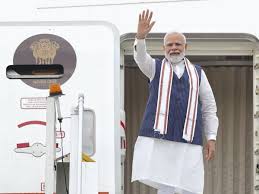India’s Quad Summit Focus and the Indo-Pacific Region: Key Insights from PM Modi’s Comments
Summary:
At the recent Quad summit, Indian Prime Minister Narendra Modi emphasized the growing significance of the Quad group in shaping the future of the Indo-Pacific region. This high-level diplomatic forum, consisting of the US, India, Japan, and Australia, is seen as pivotal in maintaining regional stability, promoting economic cooperation, and addressing shared challenges such as security and climate change.
The Importance of Quad in the Indo-Pacific Region
The Indo-Pacific region has become a major focus for global powers, particularly given its strategic importance in trade routes, regional security, and global geopolitical dynamics. The Quad (Quadrilateral Security Dialogue) brings together four major democracies—India, the US, Japan, and Australia—who share common interests in maintaining peace, stability, and prosperity in the region.
Why the Indo-Pacific Matters
The Indo-Pacific isn’t just a geographical term; it’s the heartbeat of global commerce and military strategy. With over 60% of the world’s population, this region also encompasses some of the world’s busiest maritime routes, facilitating nearly half of all international trade. Therefore, the stakes are high when it comes to ensuring the stability of these waters. Add in the complex political landscapes of nations like China, and it becomes clear why Quad nations are pushing for a more united stance.
PM Modi’s Comments: A Vision for Unity and Progress
In his speech at the Quad summit, PM Modi stressed that the Quad alliance is not aimed at any one country but is a collaborative effort to promote global peace and security. The comments underscored India’s balanced approach to regional diplomacy, avoiding direct confrontation while addressing the broader challenges in the Indo-Pacific.
Modi’s emphasis was on addressing non-traditional security threats, including climate change, technology, and healthcare. This broader vision shows that the Quad is not just about military alliances but about addressing shared global challenges.
A Closer Look at the Quad Alliance
How the Quad Has Evolved
Since its inception, the Quad has evolved into a flexible platform for cooperation. Initially formed as a response to the 2004 Indian Ocean tsunami, it later became a more formalized forum to discuss security issues, particularly in response to China’s growing assertiveness in the South China Sea. Now, the Quad focuses on various fields, including:
- Security and Defense: Ensuring freedom of navigation in the Indo-Pacific.
- Technology: Strengthening collaborations on emerging technologies like AI and 5G.
- Infrastructure Development: Funding projects that benefit countries in the region, without trapping them in debt.
- Healthcare: Working together to combat global health challenges, particularly after the pandemic.
Modi’s speech touched on all these aspects, making it clear that India views Quad as a multi-faceted alliance for global good, not just a tool for regional power plays.
India’s Role in the Quad
India has a unique position within the Quad. It shares land borders with China and has a complex relationship with the country, marked by both cooperation and tension. Unlike the US or Australia, India is located within the region, and this gives it a more nuanced perspective on the challenges and opportunities the Indo-Pacific holds. Modi’s comments reiterated India’s commitment to maintaining a peaceful and cooperative Indo-Pacific.
Challenges Ahead
While the Quad has made strides in cooperation, there are hurdles that need addressing. One of the major issues is the economic disparity between the nations in the Indo-Pacific and how to help them develop without creating imbalances. Modi’s comments acknowledged the need for sustainable development in the region, focusing on helping nations without overwhelming them with debt—a clear reference to China’s Belt and Road Initiative.
The Importance of Naval Cooperation
The Quad countries have increased their naval cooperation, conducting joint exercises like the Malabar naval drills. These exercises are meant to ensure that the waters of the Indo-Pacific remain open and free from coercive control. Modi’s speech highlighted the importance of these exercises in strengthening regional security.
Addressing Non-Military Challenges
Climate Change: A Shared Concern
Climate change is another issue that Modi addressed in his speech. The Indo-Pacific is highly vulnerable to climate change, with rising sea levels threatening the very existence of some island nations. Modi’s comments on climate change highlighted the need for collective action to mitigate its impact on the region.
Technology and Cybersecurity
In today’s interconnected world, cybersecurity is as important as traditional security. Modi’s speech also touched on the importance of safeguarding digital infrastructure. The Quad nations have committed to working together on 5G, artificial intelligence, and ensuring the security of critical digital networks.
Healthcare Cooperation
The pandemic has shown how interconnected the world is when it comes to health. The Quad has pledged to work together to improve global healthcare infrastructure, particularly in vaccine development and distribution. Modi’s comments reaffirmed India’s commitment to this cause, especially given India’s role as the “pharmacy of the world.”
The Quad’s Approach to China
While the Quad is not explicitly an anti-China alliance, it’s clear that many of its activities counterbalance China’s growing influence. China’s territorial claims in the South China Sea and its aggressive actions towards Taiwan have raised alarms among Quad nations. Modi’s comments did not single out China but made it clear that India supports a rules-based order, where no country should dominate the region at the expense of others.
The Quad’s aim is to ensure that all nations in the Indo-Pacific, big or small, have the freedom to navigate the region’s waters and airspace. It also seeks to help countries avoid becoming economically dependent on any single power.
What the Future Holds for the Quad
The future of the Quad looks promising, but it’s not without challenges. As Modi mentioned, the group needs to keep evolving to stay relevant. The Indo-Pacific is a dynamic region, and the Quad will have to adapt to new challenges, whether they are military, economic, or environmental.
One of the key issues going forward will be maintaining the delicate balance between cooperation and competition, particularly in how the Quad interacts with China. The group must also ensure that its activities do not alienate other countries in the region, particularly ASEAN nations, who may feel caught in the middle of larger power struggles.
FAQs About the Quad and Indo-Pacific Region
- What is the Quad, and who are its members? The Quad is a strategic alliance between the US, India, Japan, and Australia. It focuses on maintaining peace and stability in the Indo-Pacific region.
- Why is the Indo-Pacific region important? The Indo-Pacific region is home to crucial maritime routes and is a hub for global trade and security. It also contains over half of the world’s population.
- Is the Quad an anti-China alliance? No, the Quad is not explicitly anti-China. However, it does aim to counterbalance China’s growing influence in the region by promoting a rules-based order.
- What are the Quad’s main areas of cooperation? The Quad focuses on security, technology, infrastructure, healthcare, and addressing non-traditional security threats like climate change and cybersecurity.
- What did PM Modi emphasize in his speech at the Quad summit? PM Modi highlighted the importance of collaboration, peace, and addressing global challenges like climate change, healthcare, and technology.



